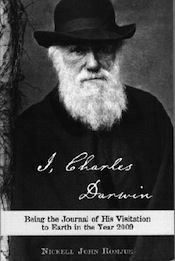 Evolution
Evolution
What Darwin Would Say If He Could Speak to Us Today: Another Perspective
 I read with interest David Klinghoffer’s review, “Would Darwin, If He Rejoined Us, Be a Darwin-Doubter?” I have not read Nickell John Romjue’s book, I, Darwin, but my own sense of Darwin as a person is that were he to return to life today, he would remain steadfast in his beliefs despite all evidence to the contrary.
I read with interest David Klinghoffer’s review, “Would Darwin, If He Rejoined Us, Be a Darwin-Doubter?” I have not read Nickell John Romjue’s book, I, Darwin, but my own sense of Darwin as a person is that were he to return to life today, he would remain steadfast in his beliefs despite all evidence to the contrary.
While I have no doubt that he would be repulsed by the evil uses to which his evolutionary ideas have been put (especially the “racial hygiene” of the Nazis), he would (as Darwinists do today) dismiss those as aberrations and distortions of his theory.
Having read his private notebooks and major works like the Origin and Descent of Man, I am convinced that he did not come to these notions by evidence but rather by experience deeply rooted in his youth, from his own family and his associations with men like Robert Edmond Grant while a teenager in Edinburgh. There he was schooled in the materialism that would become the foundation of his grand evolutionary theory.
Darwin read Hume and Comte carefully and referenced them approvingly long before he ever started his sketches of 1842 and 1844. I’ve always felt that Darwinian evolution was/is essentially a metaphysic wrapped in a veneer of scientific speculation. Some of his biographers allude to this, but the only one I know of who really comes close is Ben Wiker’s The Darwin Myth: The Life and Lies of Charles Darwin.
Despite all his claims and pleadings to the contrary, Darwin came to his ideas not by the evidence but by an a priori ideology that dictated methodological naturalism and philosophical materialism. Given this fact, I see no reason why any amount of real evidence would change his opinions.
If Darwin came back to life today I think Romjue is right that he would be repulsed by the stridency of Richard Dawkins, the crudity of PZ Myers, and the baseness of Jerry Coyne. But he would likely appreciate someone like Michael Ruse who keeps a place for religion (or anyway did until recently) in the general forum of discussion, but would remain a calm if consistent critic of ID and any teleology in the natural world.
At the end of the day, Darwin was always very conscious of his place and reputation in society, and I suspect were he to return he’d be very proud to be considered synonymous with science itself and would stand back and let more public men like Ruse, Francis Collins, and Ken Miller do his fighting for him. After all, he courted religious men like Asa Gray and let Huxley be his public defender in his own day.
As for evidence against his theory, didn’t he have good scientists like William Whewell, Adam Sedgwick, Alfred Russel Wallace, and St. George Mivart (to name a few) of his own generation point out the flaws in his theory, and aren’t many of those criticisms still valid today? Darwin remained adamant and defended himself against all these critics. Why in this generation would he be any different than he was in his own?
